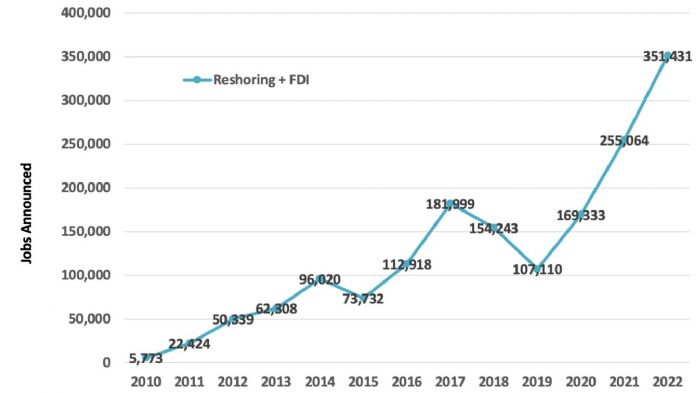• With the Inflation Reduction Act, Chips Act and Infrastructure Bill, the U.S. government finally is getting started on an industrial policy.
In 2021 the private and federal push for domestic supply of
essential goods propelled reshoring and FDI job announcements to a record high.
Projections from Reshoring Initiative 2022 Q3 data show reshoring and FDI
continuing these gains. The current 2022 projection of jobs announced is around
350,000--another record, up from 260,000 in 2021. If the projection is
achieved, 2022 will bring the total jobs announced since 2010 to more than 1.6
million.
 Supply-chain gaps and the need for greater self-sufficiency
set the stage for the current upward trend in reshoring. The risks of a Taiwan-China
conflict or China voluntarily decoupling are focusing those concerns.
Destabilizing geo-political and climate forces have brought to light our
vulnerabilities and the need to address them. The White House responded with
the Inflation Reduction Act, Chips Act and Infrastructure Bill, offering some
direction and financial security to the companies and industries intent on
filling the gaps. These government
actions are necessary in the short run but are not sufficient since the U.S.
uncompetitive cost structure is not being improved. A true industrial policy would level the playing
field via comprehensive actions such as massive skilled-workforce investments,
a 25-percent-lower USD, and retention of immediate expensing of capital investments.
Supply-chain gaps and the need for greater self-sufficiency
set the stage for the current upward trend in reshoring. The risks of a Taiwan-China
conflict or China voluntarily decoupling are focusing those concerns.
Destabilizing geo-political and climate forces have brought to light our
vulnerabilities and the need to address them. The White House responded with
the Inflation Reduction Act, Chips Act and Infrastructure Bill, offering some
direction and financial security to the companies and industries intent on
filling the gaps. These government
actions are necessary in the short run but are not sufficient since the U.S.
uncompetitive cost structure is not being improved. A true industrial policy would level the playing
field via comprehensive actions such as massive skilled-workforce investments,
a 25-percent-lower USD, and retention of immediate expensing of capital investments.
“The current actions and momentum are a great start, says Harry Moser, founder and president of the Reshoring Initiative. “A true industrial policy would accelerate the trend and increase U.S. manufacturing by 40 percent--5 million jobs. Reshoring will reduce the trade and budget deficits and make the U.S. safer, more self-reliant and resilient.”
See also: Reshoring Initiative
Technologies: Management
 Q3 2022 data, provided by the Reshoring Initiative, indicates that reshoring plus FDI (foreign direct investment) job announcements were at the highest rate ever recorded, about 15 percent above Q1 2022, the previous record. 4Q 2022 looks strong enough to reach a 2022 total of 350,000+ jobs. Top takeaways:
Q3 2022 data, provided by the Reshoring Initiative, indicates that reshoring plus FDI (foreign direct investment) job announcements were at the highest rate ever recorded, about 15 percent above Q1 2022, the previous record. 4Q 2022 looks strong enough to reach a 2022 total of 350,000+ jobs. Top takeaways: 





 Supply-chain gaps and the need for greater self-sufficiency
set the stage for the current upward trend in reshoring. The risks of a Taiwan-China
conflict or China voluntarily decoupling are focusing those concerns.
Destabilizing geo-political and climate forces have brought to light our
vulnerabilities and the need to address them. The White House responded with
the Inflation Reduction Act, Chips Act and Infrastructure Bill, offering some
direction and financial security to the companies and industries intent on
filling the gaps. These government
actions are necessary in the short run but are not sufficient since the U.S.
uncompetitive cost structure is not being improved. A true industrial policy would level the playing
field via comprehensive actions such as massive skilled-workforce investments,
a 25-percent-lower USD, and retention of immediate expensing of capital investments.
Supply-chain gaps and the need for greater self-sufficiency
set the stage for the current upward trend in reshoring. The risks of a Taiwan-China
conflict or China voluntarily decoupling are focusing those concerns.
Destabilizing geo-political and climate forces have brought to light our
vulnerabilities and the need to address them. The White House responded with
the Inflation Reduction Act, Chips Act and Infrastructure Bill, offering some
direction and financial security to the companies and industries intent on
filling the gaps. These government
actions are necessary in the short run but are not sufficient since the U.S.
uncompetitive cost structure is not being improved. A true industrial policy would level the playing
field via comprehensive actions such as massive skilled-workforce investments,
a 25-percent-lower USD, and retention of immediate expensing of capital investments.
